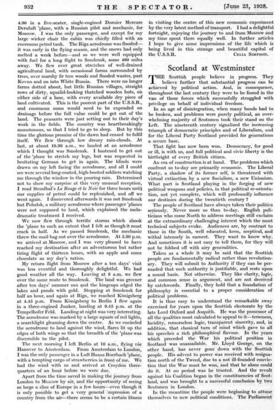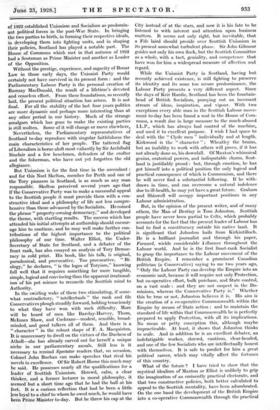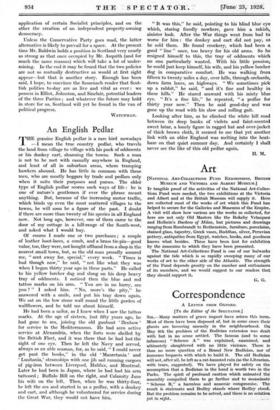Scotland at Westminster
T' Scottish people believe in progress. They believe further that substantial progress can be achieved by political action. And,_ in consequence, throughout the last. century they were to be found in the van of those forces which. successfully struggled with privilege on behalf of individual freedom.
In an age of disintegration, when many bonds had to be broken, and problems were purely political, an over- whelming majority of Scotsmen took their stand on the Left. The nineteenth century signalized the increasing triumph of democratic principles and of Liberalism, and for the Liberal Party Scotland provided for generations a secure base.
That fight has now been won. Democracy, for good or ill, is with us, and full political and civic liberty is the birthright of every British citizen.
An era of construction is at hand. The problems which confront us to-day are primarily economic. The Liberal Party, a shadow of its former self, is threatened with virtual extinction by a new Socialism;- a new Unionism. What part is Scotland playing in . the forging of new political weapons and policies, in that political re-orienta- tion, not yet complete, which will profoundly influence our destinies during the twentieth century ?
The people of Scotland have always taken their politics seriously. Never more so than to-day. English poli- ticians who come North to address meetings still exclaim at the extraordinary challenging interest which the most technical subjects evoke. Audiences are, by contrast to those in the South, well educated, keen, sceptical, and withal intensely in earnest. They want to know why. And sometimes it is not easy to tell them, for they will not be fobbed off with airy generalities.
Taken as a whole it may be said that the Scottish people are fundamentally radical rather than revolution- ary. They will submit to Authority if they can be per- suaded that such authority is justifiable, and rests upon a sound basis. Not otherwise. They like clarity, logic, and common sense in argument, and are not deceived' by catchwords. Finally, they hold that a foundation of philosophy is essential to a proper consideration of political problems.
It is thus easy to understand the remarkable sway exercised for years upon the Scottish electorate by the late Lord Oxford and Asquith. He was the possessor of all the qualities most calculated to appeal to it—terseness, lucidity, remorseless logic, transparent sincerity, and, in addition, that classical turn of mind which gave to all his speeches a rich 'philosophical flavour. In the years which preceded the War his political position in Scotland was unassailable. Mr. Lloyd George, on the other hand, has never gone down with the Scottish people. His advent to power was received with resigna- tion north of the Tweed, due to a not ill-founded convic- tion that the War must be won, and that he alone could do it At no period was he trusted. And the revolt against his Coalition began in the constituencies of Scot- land, and was brought to a successful conclusion by two Scotsmen " in London.
In the meantime the people were beginning to attune themselves- to new political conditions, The Parliament of 1922 established Unionism and Socialism as predomin- ant political forces in the post-War State. In bringing the two parties to birth, in forming their respective ideals, in developing them into fighting units, and in shaping their policies, Scotland has played a notable part. The House of Commons which met in that autumn of 1922 had a Scotsman as Prime Minister and another as Leader of the Opposition.
Without the prestige, experience, and sagacity of Bonar Law in those early days, the Unionist Party would certainly not have survived in its present form : and the Parliamentary Labour Party is the personal creation of Ramsay MacDonald, the result of a lifetime's devoted and ceaseless effort. From these foundations, so recently laid, the present political situation has arisen. It is not final. For all the stability of the last four years politics are more dynamic and perhaps more interesting than at any other period in our history. Much of the strange amalgam which has gone to make the existing parties is still molten. Some of it will change or move elsewhere.
NeVertheless, the Parliamentary representatives of Scotland to-day reproduce with singular faithfulness the main characteristics of her people. The tattered flag of Liberalism is borne aloft most valiantly by Sir Archibald Sinclair and a few henchmen, defenders of the crofter and the fisherman, who have not yet forgotten the old allegiance.
But Unionism is for the first time in the ascendant : and for this Noel Skelton, member for Perth and one of the Tory pioneers in Scotland, is as much as any man responsible. Skelton perceived several years ago that if the Conservative Party was to make a successful appeal to the Scottish people it must provide them with a con- structive ideal and a philosophy of life not less compre- hensive than those advanced by the Socialists. He coined the phrase " property-owning democracy," and developed the theme, with startling results. The success which has attended his initial attempts at authorship should encour- age him to continue, and he may well make further con- tributions of the highest importance to the political philosophy of our time. Walter Elliot, the Under- Secretary of State for Scotland, and a debater of the front rank, has also essayed an analysis of Tory Democ- racy in cold print. His book, like his talk, is original, paradoxical, and provocative. Too provocative. " Bi- ology," he declares, " is the logos of Toryism," knowing full well that it requires something far more tangible, simple, logical and convincing than the apparent irrational- ism of his pet science to reconcile the Scottish mind to Authority.
In the swirling wake of these two stimulating, if some- what contradictory, " intellectuals " the rank and file Conservatives plough steadily forward, holding tenaciously to what thay have won with such difficulty. More Will be heard of men like Barclay-Harvey, Thom, McInnes Shaw, and Cochrane—modest, sensible, broad- minded, and good talkers all of them. And there is a " character " in the robust shape of F. A. Macquisten. It is unnecessary to dwell on the virtues of the Duchess of Atholl—she has already carved out for herself a unique niche in our parliamentary annals. Still less is it necessary to remind Spectator readers that, on occasion, Colonel John Buchan can make speeches that rival his novels in excellence. Of Sir Robert Home this much may be said. He possesses nearly all the qualifications for a leader of Scottish Unionism. Shrewd, calm, a clear thinker, and a former lecturer in moral philosophy, it seemed but a short time ago that he had the ball at his feet. It is a curious reflection that had he been a little less loyal to a chief to whom he owed much, he would have been Prime Minister to-day. But he threw his cap at the City instead of at the stars, and now it is his fate to be listened to with interest and attention upon business matters. It seems not only right, but inevitable, that a Fife laird should preside over Scottish Unionism in its present somewhat turbulent phase. Sir John Gilmour guides not only his own flock, but the Scottish Committee as a whole, with a tact, geniality, and competence that have won for him a widespread measure of affection and regard.
While the Unionist Party in Scotland, having but recently achieved existence, is still fighting to preserve its identity and its none too secure predominance, the Labour Party presents a very different aspect. Since the days of Keir Hardie, Scotland has been the fountain- head of British Socialism, pumping out an incessant stream of ideas, inspiration, and vigour. With two exceptions every able man in the Scottish Labour move- ment to-day has been found a seat in the House of Com- mons, a result due in large measure to the much-abused I.L.P., which has always had control of the machine, and used it to excellent purpose. I wish I had space to deal with the " Clyde men " individually and at length. Kirkwood is the " character " ; Wheatley the brains, but an inability to work with others will prove, if it has not already done so, his downfall. Of Maxton's whimsical genius, oratorical powers, and indisputable charm, Scot- land is justifiably proud : but, through emotion, he has got himself into a political position the only logical and practical consequence of which is Communism, and there he will never find a substantial following. If he with- draws in time, and can overcome a natural indolence due to ill-health, he may yet have a great future. Graham and Shinwell will occupy important positions in any Labour administration.
But, in the opinion of the present writer, and of many others, the Man of Destiny is Tom Johnston. Scottish people have never been partial to Celts, which probably accounts for the fact that the present leader of Labour has had to find a constituency outside his native land. It is significant that Johnston hails from Kirkintilloch. He is a brilliant journalist and through his paper, Forward, wields considerable i ifluence throughout the Labour world. And he is the first front-rank Socialist to grasp the importance to the Labour movement of the British Empire. I remember a prominent Canadian politician (a Conservative) saying to me two years ago, " Only the Labour Party can develop the Empire into an economic unit, because it will require not only Protection, but co-operative effort, bulk purchase, and State control, on a vast scale : and they are not suspect in the Do- minions, whereas the Conservative Party is." Whether this be true or not, Johnston believes it is. His aim is the creation of a co-operative Commonwealth within the Empire by means of State action : and to maintain the standard of life within that Commonwealth he is perfectly prepared to apply Protection, with all its implications. No mean or petty conception this, although maybe impracticable. At least, it shows that Johnston thinks to scale. And in addition he is an excellent debater, an indefatigable worker, shrewd, cautious, clear-headed, and one of the few Socialists who are intellectually honest with themselves. It is safe to predict for him a great political career, which may vitally affect the fortunes of this country.
What of the future ? I have tried to show that the mystical idealism or Maxton or Elliot is unlikely to grip the imagination of an eminently practical electorate, and that two constructive policies, both better calculated to appeal to the Scottish mentality, have been adumbrated. On the one hand the development of the British Empire into a co-operative Commonwealth through the practical application of certain Socialist principles, and on the other the creation of an independent property-owning democracy.
Unless the Conservative Party goes mad, the latter alternative is likely to prevail for a space. At the present time Mr. Baldwin holds a position in Scotland very nearly as strong as that once occupied by Mr. Asquith (and for much the same reasons) which will take a lot of under- mining. In the end it may be found that the two policies are not so mutually destructive as would at first sight appear—but that is another story. Enough has been said, I hope, to convince the Sassenach reader that Scot- tish politics to-day are as live and vital as ever : we possess in Elliot, Johnston, and Sinclair, potential leaders of the three Parties ; and whatever the future may hold in store for us, Scotland will yet be found in the van of political progress.
WATCHMAN.
































 Previous page
Previous page